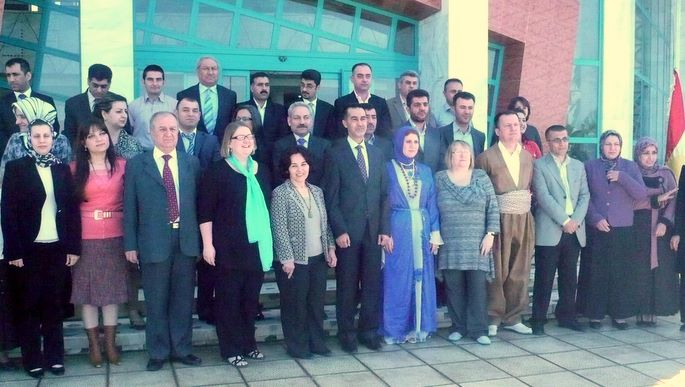New Scottish and Iraqi university collaboration
An exciting new collaboration between the University of Glasgow and Hawler Medical University (HMU) has begun this year in Erbil, Kurdistan, Northern Iraq. This work is funded under the Delphe/Iraq programme by the British Council/DFID. After an exploratory visit last August 2010, HMU identified that they would like assistance with curriculum developments from staff at the University of Glasgow. They requested a year-long programme of initiatives to help them transform their predominantly didactic teaching approach across the HMU into a more student-centred model of teaching and Lynette Jordan of the School of Education, Dr Catherine Bovill of the Learning & Teaching Centre and Natalie Sinclair, a PhD student in the School of Education devised a programme including two sets of interactive workshops and a range of online activities which would help them to adopt more student centred approaches.

Visit 1 took place in March 2011 and the workshop participants consisted of professional staff from the Dentistry, Nursing, Medicine and Pharmacy Departments. There were 30-34 participants present during the workshops held over four days, with nearly 50% of participants being female (a stipulation of all DELPHE Iraq projects is that a minimum of 25% of women are involved in the projects). All participants were involved in actively contributing to the workshops and many of the HMU staff were insightful and creative in their responses to new ideas. They demonstrated a good understanding of student-centred learning in the questions they asked, comments they made and course design tasks they completed. They were overwhelmingly positive and motivated to implement student centred learning approaches.
Overall, the participants’ feedback on the workshops so far has been positive. One of the participants at Hawler described her understanding of student-centred learning as ‘A method which stimulates the student to think actively, share in forming the knowledge and the goal of the lecture. Teacher power shift to student power’. Another claimed, ‘I'll have more time to prepare more things for students instead of writing the lecture in detail that would be boring. I'll be more close to students, I'll know the defects, problems and I can solve them’. Pre and post test evaluation questionnaires have been carried out and we will continue to gather this data more longitudinally with another set of data to be collected after the second set of workshops in September 2011.
Currently the participants are busy videoing their teaching sessions with students and they are peer reviewing each other’s teaching and discussing the relative value of student centred learning in relation to one another’s work.
The second set of workshops will run in Erbil in September 2011 when UoG staff will return to complete the programme of activities including discussion of plans for sustaining changes to teaching practices. As one participant said, ‘I have more understanding of its benefits after we practised it. I am now more prepared to practice it and my fear and anxiety…has decreased. The UoG staff hope to continue to support and inspire their colleagues at HMU and look forward to returning in autumn to work with them again.
 Printer-friendly version
Printer-friendly version- Lynette Jordan's blog
- Login to post comments
- 162 reads




